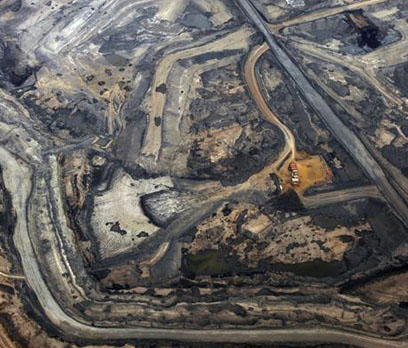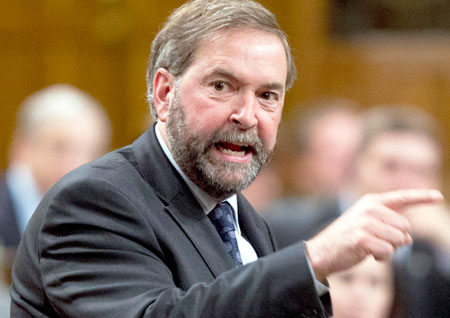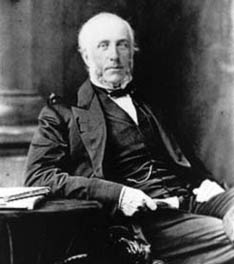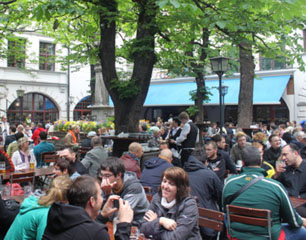Mulcair melodies on oil sands fever .. and other new Canadian body parts that blossomed while we were away
May 30th, 2012 | By Randall White | Category: In Brief
Police have identified a suspect wanted in connection with the discovery of a man’s torso stuffed in a locked suitcase in Montreal – whose hand and foot were mailed to Ottawa – as Luka Rocco Magnotta. Handout / Facebook.
A week can be a long time in politics, as the legend has it. And getting back to the home and native land from the counterweights Western Europe conference circuit suggests that two weeks and a few days can be even longer.
It’s almost as if since we’ve gone the nights of Canadian politics have been getting strange, nothing’s making sense, we’re stumbling in the shade, and everything’s in (quite im-) perfect tense.
Such key current headlines as “Severed hand and foot delivered in Ottawa now linked to torso found in Montreal” are just the most bizarre expressions of the new trends. A Globe and Mail report yesterday sounded one especially alarming note: “Second package containing body part found near Tory headquarters … A former RCMP criminal profiler said it’s the first time he’s heard of a Canadian political party being the target of such a horrific act. ‘This is the kind of stuff you might see in developing countries where you have dictatorships and coups’ …”

Luka Rocco Magnotta has been linked to Karla Homolka, accomplice of another disturbing Canadian murderer Paul Bernardo, though Magnotta himself has denied he ever knew her. PHOTO: ARCHIVES LA PRESSE.
(The second package, subsequent news suggests, was in fact destined for Liberal headquarters. And there are even reports that link the perpetrator of these appalling acts with Karla Homolka. Canada may once have been a peaceable kingdom, maybe. But it has perhaps always had its dark undercurrents. And something today is bringing them closer to the surface.)
Meanwhile, I suppose it’s not surprising that the much anticipated demonization of new federal NDP leader Thomas Mulcair has broken out of the barn with a vengeance. Even if some would say he is a major author of his own demonized persona?

In its latest prognosis of the Canadian energy industry, the Pembina Institute in Alberta says Canada has 'oil sands fever', a unique strain of the so-called Dutch Disease. Photograph by: Todd Korol, Reuters files.
See, eg, in any case: “Thomas Mulcair says he’s not beating up on West with oilsands critique” ; “Yaffe: Mulcair risks reigniting western separatism” ; “Thomas Mulcair has remortgaged home 11 times, newspaper reports” ; and “Tim Harper: NDP leader Tom Mulcair invades enemy territory.”
You could argue (as I’m certainly inclined to do myself, for the time being) that Mulcair has at least begun a Canada-wide debate on such things as resource-led economic development and Dutch diseases that cannot be avoided, despite all its potential for sowing regional discord. On this front see, eg: “Canada suffering from ‘oil sands fever’ –Â Alberta report” ; and “Oil sands fuels think-tank debate over Dutch disease.”

More than two-thirds of all oilsands production in Canada is owned by foreign entities, sending a majority of the industry's profits out of the country, says an analysis released a few weeks ago by a BC-based conservation group.
The apostles of the new Canadian resource sector (a revival of an ancient theme of course) will not finally be able to just bully their way out of all this. The real economic development issues at stake are too complex and multi-dimensional. And there is as yet still very little solid ground in such related media musings as : “Western premiers pledge support for pan-Canadian energy strategy” ; “Western premiers find common ground on energy, resource issues” ; “Western provinces come together in single, united voice” ; “BC premier misses Western Premiers’ Conference” ; “Mulcair to get an earful during oilsands tour” [tomorrow] ; and “Coyne: Is Mulcair’s oilsands gambit an astute attack on the Tories’ base?” [Mr. Coyne’s answer is NOT, but he could be wrong.]
* * * *

NDP Leader Thomas Mulcair during question period in the Canadian House of Commons in Ottawa, May 17, 2012. Photo: Adrian Wyld / THE CANADIAN PRESS.
In fact, recent opinion polls seem to be showing that neither Mr. Mulcair’s oilsands critique nor his remortgaged home have as yet sealed any death warrant on his federal political career. A few days after we left for Europe, in the middle of May, it was reported that “Economics dividing Canadians between Tory, NDP camps: poll.”
More recently, some two weeks later: “Canada tilting to left of political spectrum, shows new poll … this … by Forum Research, has the NDP poised to form a minority government in the next election … The poll claims a wide majority of Canadians – more than three-quarters – think Canada suffers from an income gap, where the rich are getting too rich and the poor are getting too poor … Regionally, Albertans were the least likely to worry about an income gap (63 per cent did), compared with 89 per cent in Atlantic Canada, 80 per cent in British Columbia, 78 per cent in Ontario, 77 per cent in the Prairies and 76 per cent in Quebec.”

Protesters opposing Quebec student tuition fee hikes bang on pots and pans during a demonstration in Montreal, May 24, 2012. PHOTO: THE CANADIAN PRESS/Graham Hughes.
The Canadian West is also not the only northern North American region bubbling with fresh bafflements at the moment. A quick scan of local newspapers on a railway car through the centre of Germany a few days ago showed the only Canadian news of any interest turned around current events in Montreal.
Back in the home and native land a few days later, the same events were breeding such English language headlines as “Parizeau compares Quebec unrest to Quiet Revolution” and “Hébert: No clear winner has emerged from Quebec’s spring of discontent.”

George Brown, who founded what is now the Globe and Mail, was the real Mother of Confederation in Canada, not Queen Victoria, who didn’t even bother mentioning the event in her diary for July 1, 1867.
Finally, I can only confess that I was at least humourously distressed to return home to such headlines as : “English Canada favours keeping monarchy: poll” [albeit a less than convincing poll, on various grounds, and then Quebec, along with huge chunks of the rest-of-Canada demography, is still of course quite other-minded] ; “Queen Victoria, the ‘Mother of Confederation,’ made no mention of the event in her diary” [actually, according to the late Canadian historian Maurice Careless the “Mother of Confederation” was George Brown not Queen Victoria, but this just shows how much of a captive of the colonized mind so much of English Canadian journalism remains] ; “Confederation fails to make Victoria’s diary” [see above, again] ; and “Celebrating the Diamond Jubilee of Elizabeth II, Queen of Canada” [in the Toronto Star, of all places – a kind of strange British North American neocolonial revival of the old Tory Toronto past in the old Daily Walter Gordon, that I personally find entirely beyond any serious form of rational explanation!].
In fact, it does not take too much travelling about in foreign places like Western Europe to appreciate that those few local residents who take any interest in Canadian subjects at all are both amused and bemused by Canada’s continuing official attachment to the symbolism of the British monarchy. “Kanada ist immer noch eine Kolonie von Großbritannien?” a German colleague asked with some enjoyment over a post-conference beer last week.
I don’t speak German at all, but I knew what he was saying, even before it was translated for me by another equally amused colleague (“Is Canada still a colony of Great Britain?”). I pretended to be amused myself, before urging that it was the Canadian prime minister and not the British colonial office who nowadays appoints the Governor General of Canada. But I was embarrassed all the same!
Such vast subtleties as the “Queen of Canada” are seriously intelligible only to the still dwindling minority of the most resolute Canadian monarchists. The few people in other countries who bother to think about such things just believe we have not yet quite grown up. And they are right.


